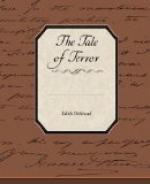“’The Rose of Raby,’[102]
‘Delmore,’ or ’The Nun’[103]—
These promise something, and may please,
perhaps,
Like ’Ethelinda’[104] and
the dear ’Relapse.’[105]
To these her heart the gentle maid resigned
And such the food that fed the gentle
mind.”
But even the “delicate distress” of heroines, like Niobe, all tears, palls at last, and Belinda, having wept her fill, craves now for “sterner stuff.”
“Yet tales of terror are her dear
delight,
All in the wintry storm to read at night.”
In The Preceptor Husband,[106] the pretty wife, whose notions of botany are delightfully vague, and who, in English history, light-heartedly confuses the Reformation and the Revolution, has tastes similar to those of Belinda. Pursued by an instructive husband, she turns at bay, and tells her priggish preceptor what kind of books she really enjoys:
“Well, if I must, I will my studies
name,
Blame if you please—I know
you love to blame—
When all our childish books were set apart,
The first I read was ’Wanderings
of the Heart.’[107]
It was a story where was done a deed
So dreadful that alone I feared to read.
The next was ’The Confessions of
a Nun’—
’Twas quite a shame such evils should
be done.
Nun of—no matter for the creature’s
name,
For there are girls no nunnery can tame.
Then was the story of the Haunted Hall,
When the huge picture nodded from the
wall,
“When the old lord looked up with
trembling dread,
And I grew pale and shuddered as I read.
Then came the tales of Winters, Summers,
Springs
At Bath and Brighton—they were
pretty things!
No ghosts or spectres there were heard
or seen,
But all was love and flight to Gretna-green.
Perhaps your greater learning may despise
What others like—and there
your wisdom lies.”
To this attractive catalogue the preceptor husband, no doubt, listened with the expression of Crabbe’s Old Bachelor:
“that kind of cool, contemptuous
smile
Of witty persons overcharged with bile,”
but she at least succeeds in interrupting his flow of information for the time being. He retires routed. Crabbe’s close acquaintance with “the flowery pages of sublime distress,” with “vengeful monks who play unpriestly tricks,” with banditti
“who,
in forest wide
Or cavern vast, indignant virgins hide,”
was, as he confesses, a relic of those unregenerate days, when
“To the heroine’s soul-distracting
fears
I early gave my sixpences and tears."[108]
He could have groped his way through a Gothic castle without the aid of a talkative housekeeper:
“I’ve watched a wintry night
on castle-walls,
I’ve stalked by moonlight through
deserted halls,
And when the weary world was sunk to rest
I’ve had such sights—as
may not be expressed.
Lo! that chateau, the western tower decayed,
The peasants shun it—they are
all afraid;
For there was done a deed—could
walls reveal
Or timbers tell it, how the heart would
feel!




